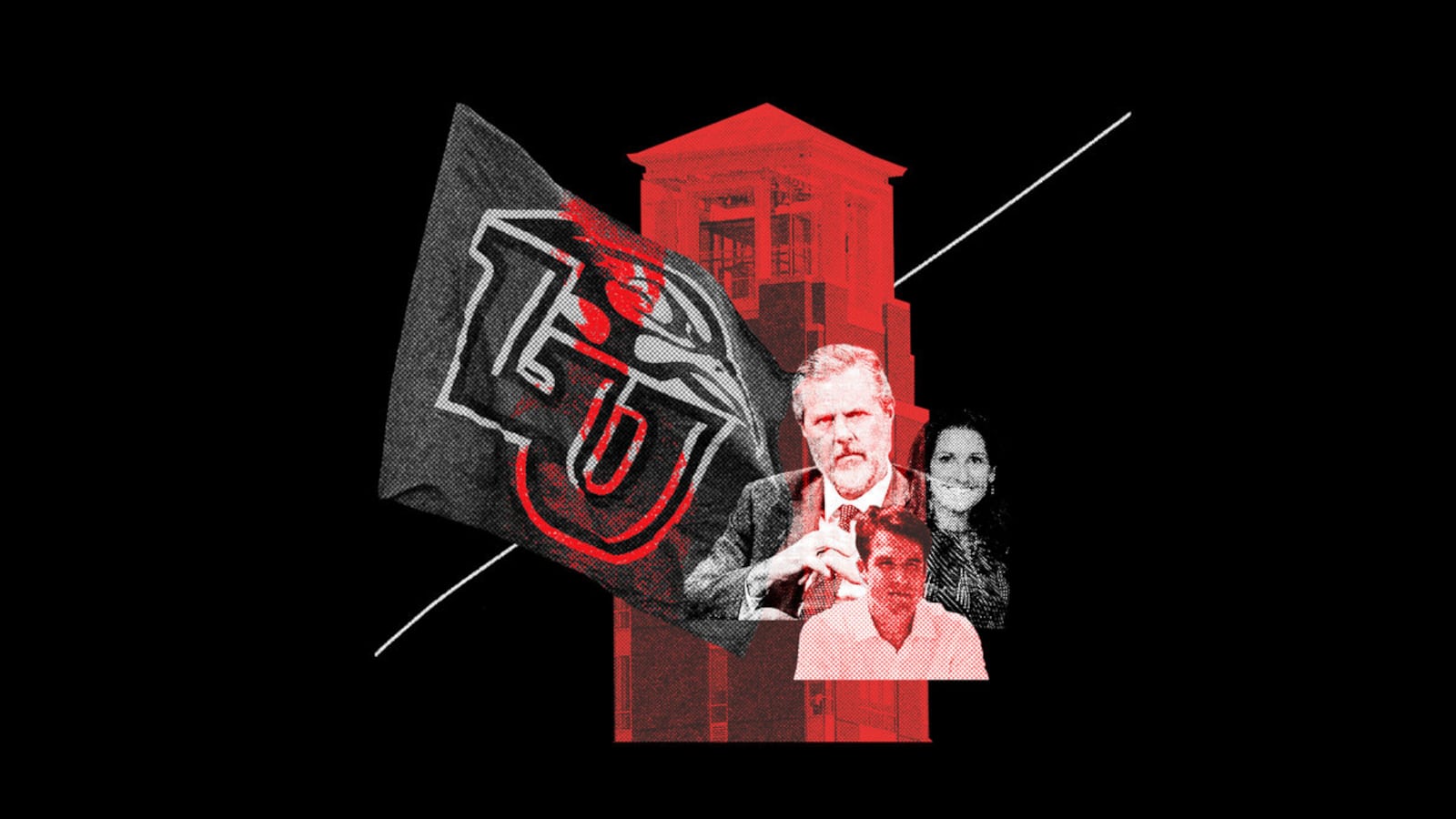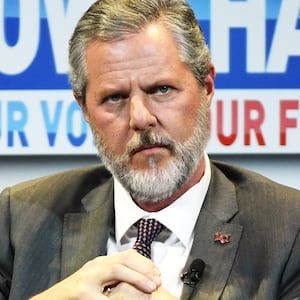In another week or so, the world will have a better understanding of the special relationship between Jerry and Becki Falwell—first couple of the modern evangelical movement, former powerhouses, and stewards of Liberty University (the largest evangelical university in the country), whose unprecedented endorsement probably guaranteed Donald Trump the presidency—and Giancarlo Granda, the hapless “pool boy” who spent his twenties in a misbegotten affair with them. (That is, if it’s fair to saddle a young man of 32 with a master’s degree from Georgetown University in Real Estate Finance and Development with such an unfortunate epithet.) That’s because Giancarlo’s book, of which this writer is the co-author, dropped on October 25 (Off the Deep End, by Giancarlo Granda and Mark Ebner, Harper Collins Books). On November 1, God Forbid, Billy Corben’s independent but overlapping documentary on the Falwells and their affair to remember, will premiere on Hulu.
The Falwells’ sexual peccadillos blew up into such a media frenzy in part because of the puritanical views of the evangelical community, which they quite intentionally came to embody, and the breathtaking hypocrisy of living their lives on such extreme parallel tracks, and amid such cognitive dissonance.
As Giancarlo writes in the book, “The sex was never the issue; it was the hypocrisy and the abuse of power. Because they helm an institution whose business it is to shame others for what they do in private, and to hold the threat of shame over them to demand fealty and subservience.”

U.S. President Donald Trump (L) and Jerry Falwell (R), President of Liberty University, on stage during a commencement at Liberty University May 13, 2017 in Lynchburg, Virginia.
Photo by Alex Wong/Getty ImagesThis refers specifically to “the Liberty Way,” an elaborate and punitive honor code that demands students there refrain not only from premarital sex and traditional college vices like drinking and smoking, but also using profane language and being alone with a member of the opposite sex, particularly at off-campus residences. In practice, this quickly becomes a way to control women, since they’re the ones who must deal with the fallout, be it pregnancy, damage to their reputation, or sexual violence. Traditionally, there was no way to report a sexual assault there without risking violating the Liberty Code, and with it one’s tenure or standing at the university.
As has been tirelessly reported by Politico, ProPublica, and especially the Gangster Capitalism podcast, this has led to what amounts to an epidemic of campus rapes at Liberty, allegedly enabled in part by the institutional decisions of the university itself, of which Jerry Falwell was both President and Chancellor. Chelsea Andrews, a former Liberty senior class president and campus rape survivor, took to Twitter in 2021 to protest Becki and Jerry, who by then had resigned in disgrace, hosting Liberty students at a party at their home—where, she noted in a letter to the Liberty board, “…his wife is alleged to have initiated oral sex on a drunk, sleeping student.”

Giancarlo Granda- the Miami hotel "pool boy" whose accusations of a marital affair helped lead to Jerry Falwell's resignation from Liberty University.
Toni L. Sandys/The Washington Post via Getty ImagesThis last part was in reference to an article in Politico that quoted a former Liberty student who had played in a band with the Falwells’ son Trey, describing his claim that, during a 2008 sleepover at a converted barn and makeshift practice space on the Falwells’ property in Goode, Virginia (20 miles up the road from Lynchburg and Liberty), Becki, unsolicited, climbed into bed with him and insisted on administering him oral pleasure. Just as with Giancarlo, he claims this followed intense flirtation on Becki’s part, and that she refused to stop long after he stopped responding to her advances—allegedly even going so far as to contact him through a fake Facebook account under an assumed name and photo. Also, like Giancarlo, the unnamed student backed up his claims with emails, text messages, and screenshots, reported experiencing feelings of low self-worth, and used the term “grooming” to describe Becki’s behavior.
After Chelsea posted a petition signed by 71 fellow alumni protesting the Falwells’ party (which was subsequently canceled for health reasons), she says a number of women contacted her to discuss their own experiences under the Falwells’ tenure at Liberty, which included gruesome stories of campus assaults, as well as an administration that seemed hidebound in discouraging them from speaking out.
Eventually, a dozen women came forward (their number ultimately swelled to 22) to file a multi-plaintiff lawsuit against the university under Title IX of the Education Amendments of 1972, which prohibits sex-based discrimination for colleges that receive federal funding, and specifically the Clery Act, which, as amended in 2013 (quoting from Liberty’s website), “requires higher education institutions to annually report certain information concerning campus security policies and campus crime statistics.” These women came to be known as the “Jane Does” for their anonymous appearance in court documents. Many more came forward in the Gangster Capitalism podcast and elsewhere.

An image of Giancarlo Granda and Jerry Falwell Jr. from the Hulu docuseries 'God Forbid.
'Courtesy Giancarlo Granda/HuluA 2021 ProPublica article by Hannah Dreyfus chronicled numerous examples of a university administration that appeared to be in denial or worse, including allegations that evidence was ignored; photos of bruises and physical evidence went missing from victims’ files; police discouraged victims from filing charges or they weren’t made aware that was an option; witnesses’ statements were twisted to claim the opposite of their intention; and the counseling center turned victims away when “they didn’t have any appointments available.” According to the article, victims failed to come forward on the strength of these implicit threats, while assailants faced no disciplinary actions—with the result that victims who routinely encountered their attackers on campus eventually stopped going to class. The university’s unique focus on sexual purity—in the form of “victim notices” they must sign acknowledging the possibility of disciplinary action for violating the Liberty Way—was also apparently used as a cudgel to dissuade victims from pursuing formal action, amounting to “a conspiracy of silence.”
In early May 2022, many of the Jane Does settled with the university for undisclosed amounts. But one member of that original group, known publicly as Jane Doe #15, refused to settle, and as such is not bound by any nondisclosure agreement. The subject of a bonus episode of Gangster Capitalism, her story is perhaps the most brutal of all: In 2001, as an 18-year-old Liberty student, she claims she was gang-raped by five men in a Lynchburg shopping mall, became pregnant and was stalked on campus by one of her assailants with a knife, only to be threatened with disciplinary action by the university. In a chilling epilogue, she claims that she was advised by a dean that if she entered a residential program for unmarried mothers, the Liberty Godparent Home, and agreed to give up her baby, she would receive a free four-year scholarship.
Jane Doe #15 claims that despite similar settlements elsewhere in the range of $2 million to $5 million, Liberty’s opening offer was $5,000, with a final offer of $35,000 per participant, for which they cited the two-year statute of limitations that prohibited them from pursuing civil cases against the university—an offer she found “insulting.”

Supporters of the Jane Doe's, student-organization Justice For Janes and alumni-organization Save71 hold up a sign during a rally to call for a third-party audit of the mishandling of sexual assault cases on Liberty University's campus in Lynchburg, Va. on Thursday, Nov. 4, 2021.
Kendall Warner/The News & Advance via APRepresentatives of the Department of Education recently conducted over 70 interviews at Liberty, where they are investigating the university for potential violations of the Clery Act. This past June, the Biden administration released a list of proposed changes to Title IX regulations designed to protect students from sexual discrimination and sex-based harassment, which are currently under review by the public. As it currently stands, several U.S. senators, including both of those from Virginia, have called for a federal investigation into Liberty University.
Giancarlo and I spoke with a number of Liberty sexual assault victims—both Jane Does and some not yet publicly identified. At least one, Jane Doe #16, claims she was sexually assaulted by a member of Liberty’s football team—at one point posting on Instagram, “My assailant is playing on the Liberty football field. Right. Now.” Although within a day she went to both the emergency room and the Title IX office on campus, her alleged assailant was cleared of all liability, both at the time of the incident and later on appeal. Two days after her complaint, a second student filed an almost identical complaint against the same player, and in his statement, the alleged assailant conflated details of the two victims.
This player was recruited during the tenure of Liberty football coach Hugh Freeze, who as head coach at Ole Miss, was forced to resign in 2017 for recruitment and academic violations, and 27 of the team’s 39 wins over five seasons were vacated. (Freeze did himself no favors by placing a dozen calls to a Tampa escort service on his university cell phone. As a legendary Memphis high school coach, Freeze was profiled in the Michael Lewis book The Blind Side.) Despite this ignominious fall from grace, Liberty aggressively pursued a campaign to hire him as head coach, including a $3 million salary and a specially built house on a hilltop overlooking the campus, with Falwell reportedly flying down to close the deal personally.
In what must be a profound coincidence, Liberty had only two years earlier hired athletic director Ian McCaw, who resigned from Baylor University amid multiple sexual assault charges against the Baylor football team (the same scandal that forced the resignation of university chancellor Kenneth Starr). This could be attributed to good business sense, picking up proven commodities at bargain prices. But it had the secondary effect of surrounding Falwell with disgraced dignitaries with their own attendant sex scandals. (Football remains the largest source of income for Liberty outside of online learning, in which Liberty is second in enrollment only to Phoenix University.)
It remains no great leap to believe that Liberty University, under the stewardship of Jerry Falwell, allowed (if not encouraged) this culture to prevail for the simple reason that they implicitly promise well-appointed, conservative Christian parents that their children will be safe from the secular world, an article of faith memorialized in the Liberty Way. And as long as the Liberty campus, with its manicured lawns and nostalgic charm, remains a picture postcard of the frozen past, it serves as a marketing tool for its online adjunct, which is where the real money is. Everything else—academic standing, faculty autonomy, biblical values, and Christian charity—remain subservient to this principle. As Liberty’s former senior vice president of communications, currently embroiled in a blood feud with Liberty, notably observes in the ProPublica article, “The problem isn’t the PR. The problem is the problem.”
Several of the women we spoke to, beginning with Chelsea, let it be known that it was Giancarlo’s example, by going public with embarrassing sexual details in the service of a larger story, which in part encouraged them to tell their own stories—in ways that he never could have envisioned, and on a scale against which his own story pales in comparison. In turn, it was their examples that animated much of the story he subsequently chose to tell. As he says in the book, about the Falwells and their twisted legacy:
“I had come to realize [Jerry] had single-handedly created a toxic culture that systematically abused Liberty University students, faculty, and staff. LU students, parents, employees and other stakeholders deserved to know who the Falwells were behind their public facade.”






